Online meeting for the presentation of the draft -“Manual of public participation in the decision-making process of the Assembly”
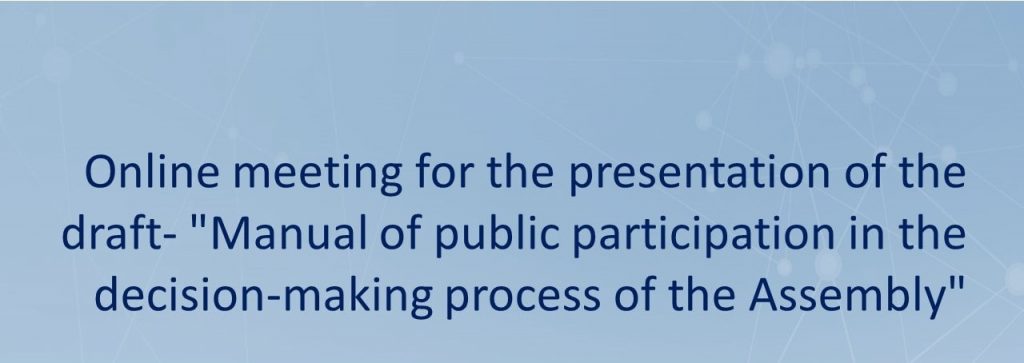
Following the consultation process with civil society organizations for the drafting of the “Manual of public participation in the decision-making process of the Assembly” The Albanian Parliament held an on-line meeting in order to present the document which reflected the comments sent by CSOs.
National Resource Centre has been part of this process since and in cooperation with Institute for Democracy and Mediation (IDM), a few months ago organized a consultation with the participation of 21 NPOs, whose comments and suggestions were sent to the Assembly. We find that some of the suggestions related to the terminology used, the register of petitions, the consultation platform and access as NPOs, the formats of requests to the Assembly, etc. have been taken into account.
Meanwhile, the non-addressing of some issues related to the consultation deadlines, the reflection of feedback and the return of responses, etc, remains a concern. These concerns were brought again by NRC at the attention of Assembly representatives. as part of the meeting with the Assembly. The Assembly will soon share the revised draft
For all CSOs interested in giving their opinion, the MANUAL is still available on the Assembly’s public consultation platform.
Online self-assessment tool for CSOs in Albania – standards4npos
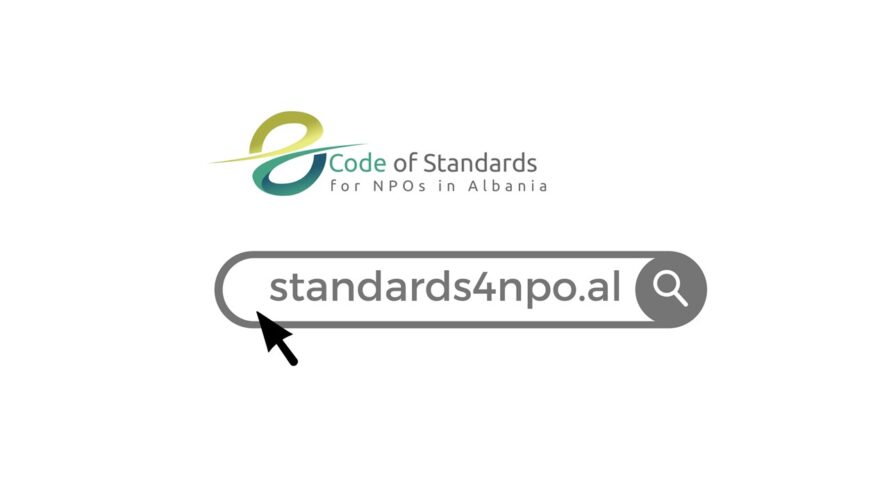
The online self-assessment mechanism STANDARDS4NPOs is designed to help CSOs to assess in a qualitative (automatic written suggestions) and quantitative (scoring system) their governance standards; administrative and financial procedures; human resources (hiring/firing/promotion) policies; accountability towards beneficiaries/members; financing, fundraising and resource management; responsible advocacy and partnership building, among many others.
It aims to guide the way CSOs operate and take action to improve the results of their work in a strategic and planned way. For all the CSOs willing to increase and improve their standards of work, the National Resource Centre for Civil Society in Albania has already rolled out its capacity-building program targeting in a tailored way CSOs at different stages of institutional development.
The Assessment Tool is web and application-based and is available in Albanian and English. You can access it through the website here: https://standards4npo.al/ or download the application from Play Store for Android and App Store for IOS.
Any questions or information regarding STANDARDS4NPOs, contact National Resource Centre at +355 4 2254881, or info@resourcecentre.al
Online Training Programs on “Fiscalization”
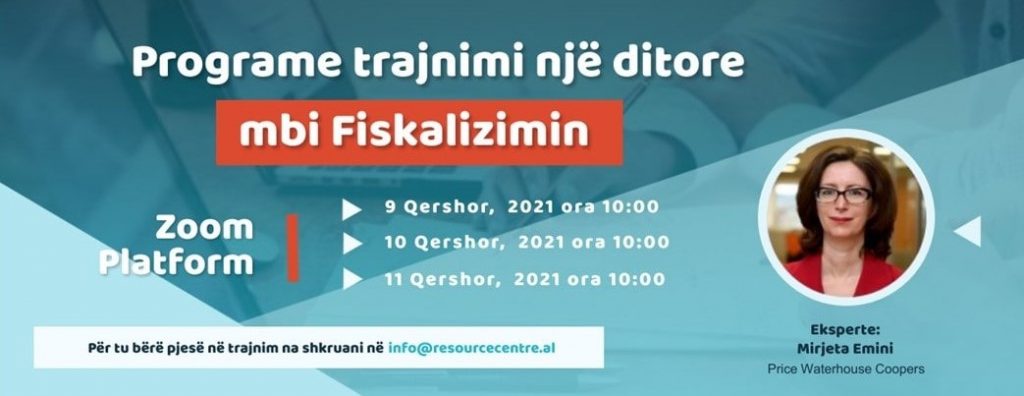
[vc_row][vc_column][vc_column_text]
For all civil society organizations!
From January 1, 2021, the implementation of Law no. 87/2019 “On the Invoice and the turnover monitoring system”. From 1 July 2021, all invoices that will be issued and received among taxpayers (including NPOs), will have to be Electronic Invoices and exchanged ONLY through the Central Invoice Platform.
We bring to the attention of all civil society organizations the need to take appropriate measures to fulfill the legal obligation, referred to Law no. 87/2019 “On the Invoice and the Circulation Monitoring System”. The National Resource Centre for Civil Society and Partners Albania, on June 9, 10 and 11, 2021, will organize one-day online training programs on “Fiscalization”.
Training program expert:
Mirjeta Emini is a Leader of PwC Albania after working with KPMG and as a Partner with Boga&Associates. Mirjeta has broad experience both in accounting and tax matters. She is an expert of the tax legislation in Albania giving her contribution in the improvement of the fiscal framework for business and non-for profit sector. During her career, she has provided tax and accounting advice on complex transactions and has supported many clients investing in Albania and Kosovo.
Mirjeta is a member of the Institute of Chartered Auditors of Albania, Kosovo Institute of the Certified Public Accountants, a Board member of the Partners for Change, an advisor near the National Accounting Council in Albania, and a former Treasurer of the French Chamber of Commerce in Albania.
If you are an interested organization in participating, you may directly confirm their participation by registering in one of the links below on the respective date, or by contacting us at info@resourcecentre.al within June 4, 2021, at 16.00.
- July 9, 2021 – 10:00
https://us02web.zoom.us/meeting/register/tZAlcuutrjgpHtCPLDLomHchoWF472p-RBIf
Meeting ID: 848 5250 3344
- July 10 , 2021 – 10:00
https://us02web.zoom.us/meeting/register/tZcocu2rqzMuGNFd3BkREPSZm5oQNQT39-I8
Meeting ID: 835 5435 8425
- July 11, 2021 – 10:00
https://us02web.zoom.us/meeting/register/tZUtcumurT4iHdYIt-Mg5MB5V-eElM3OxCxv
Meeting ID: 810 5063 5872[/vc_column_text][/vc_column][/vc_row][vc_row][vc_column][vc_single_image image=”5365″ img_size=”full” style=”vc_box_shadow”][/vc_column][/vc_row]
Open letter on some clarifications and amendments to the law “On Accounting and Financial Statements”

To:
Mr. Gramoz Ruci, Chairman of the Parliament of Albania
Mrs. Anila Denaj, Minister, Ministry of Finances and Economy
Mrs. Vasilika Hysi, Deputy Chairman of the Parliament and Chairperson of the Subcommittee on Human Rights
Mr. Ulsi Manja, Chairman, Committee on Legal Affairs, Public Administration and Human Rights
Mr. Arben Ahmetaj, Chairman, Committee on Economy and Finances
For information:
Mrs. Ogerta Manastirliu, Minister, Ministry of Health and Social Protection; Chairman of the National Council of Civil Society
Mr. Mario Mariani, Head of Co-operation, Delegation of the European Union in Albania
Mrs. Leyla Moses-Ones, Chargé d’Affaires, Embassy of the United States in Albania
His Excellency Mr. Adrian Maître, Ambassador of Switzerland in Albania
His Excellency Mr. Duncan Norman, Ambassador of the United Kingdom in Albania
His Excellency Mr. Johan Ndisi, Ambassador of Sweden in Albania
Her Excellency Mrs. Guusje Korthals Altes, Ambassador of the Netherlands in Albania
Mr. Enton Duro, Director of the General Directorate of Taxation
Mrs. Elira Hoxha, Executive Director, National Accounting Council
Mr. Andi Kananaj, Executive Director, Agency for the Support of Civil Society
Mrs. Eriola Muka, Director, Directorate of Policies and Priorities for Development at the Prime Minister’s Office
Mr. Blendi Dibra, Vice-Chairman of the National Council for Civil Society
Subject: For some clarifications and amendments to the Law “On Accounting and Financial Statements”
We, a group of civil society organizations, have become aware of Law no. 25/2018 “On Accounting and Financial Statements”, through an invitation from the National Accounting Council (NAC) as the designated body for drafting the performance report format that NPOs have to submit to it under the applicable law.
The law was published in the Official Gazette No. 9222 on May 17, 2018 and has entered into force since 1 January 2019. This law has been drafted and approved without the knowledge and participation of the sector and comes to the attention of civil society organizations only at this moment when the process of drafting the reporting formats from the NAC has begun.
The civil society sector itself has many issues that need to be addressed internally. These issues are being discussed at forums across and beyond the sector in order to increase the NPOs functioning standard, the quality of its activity and the increased transparency of NPOs. Proper and unequivocal treatment of NPO financial reporting is essential to their development and is one of the important priorities set out in the Roadmap for the Government Policy Towards more Enabling Environment for Civil Society Development 2018-2022, a Strategic Document for the development of the sector.
Law no. 25/2018 “On Accounting and Financial Statements” brings some new changes and additions to the reporting of non-for-profit entities, which are a concern and a step backwards regarding the reporting of civil society organizations.
Specifically, the issues of concern are listed as follows:
- Article 13, item 5, the law seems to abolish the relief provided by the NAS for NPOs, set in the Order of the Minister of Finance No. 62 dated 17.09.2015, regarding the presentation of financial statements for organizations with a total asset or total income less than ALL 5 million, unifying the type of financial statements for all NPOs. In fact, the reporting according to the financial statements set out in this law, against the “income-expense” format set out in the NAS would make the financial reporting irrelevant and would be a burden to the institutional capacities of many small organizations and those operating on volunteer basis.
This change represents a step backwards in creating an enabling environment for NPOs in the country, not taking into consideration the (non-profit) nature of the work, and the size of NPOs. This change contradicts even the best practices in this regard.
- Article 17, item c, provides for the obligation of NPOs whose the total asset or total income in the financial statements exceeds 30 million ALL, to prepare the performance report, a report which together with the financial statements should be published on the organization’s official website.
According to the description in paragraphs 1 and 2 of Article 17 of the law, on the content of this report, and also the preliminary discussion on the format of this report, it seems to be not in compliance with the non-profit nature and activity of NPOs.
BUT, the main concern with this request is related to the motivation and need of lawmakers to assess the performance of these organizations, which for the sake of legal definition are the largest organizations in the country whose focus is human rights protection; monitoring, evaluating and denouncing of corruption cases at all levels of the state; monitoring of the elections and advancing the legal framework in this regard, etc.
Performance assessment at a time when these organizations are not contractually and financially related to the state, said otherwise when they do not use state funds or receive tax and financial reliefs, makes it unjustified. Moreover, this is considered to be a violation of the freedom and independence of the non-profit sector.
The requirement for the preparation and publication of the organizations’ performance report becomes even more odd when it is not determined which is the appropriate institution to assess this performance; which is the Albanian or international standard to assess the performance against, and eventually make judgement on its conformity; which are the penalties for organizations that do not meet the performance standard.
All these questions make this requirement of the law pose a high potential risk for state intervention in the independent activity of the non-for-profit sector.
In accordance with the existing legal framework, NPOs prepare and submit financial statements to tax authorities and are subject to ongoing monitoring by them. They also submit activity reports directly to donors and public institutions from which they receive funding, in accordance with the relevant rules and procedures. Western practice, including some Western Balkan countries, includes the requirement to produce an annual activity report and provide public access (in any form, but not determinant on the official website). But this is only about those organizations that have the status of “For Public Benefit” and those who benefit from public funds.
- Article 22, item 1 of the law provides the obligation of entities to “… submit to the respective authority where they are registered, the annual financial statements for publication…”. In the case of non-profit organizations, the “respective authority” is the Tirana District Court.
This obligation is an added burden to civil society organizations, especially those from outside Tirana, that will have additional costs to present their financial reports and other documents that the law provides, to the Tirana District Court.
On the other hand, this demand does not bring any added value in terms of sector transparency, public access or facilitation of control and monitoring by relevant institutions. The court does not have an institutional mandate to manage or use this type of information. While the financial statements are submitted by non-profit organization in the Regional Taxation Directorates like any other entity, this new requirement of the law is unjustified. Any need for information both for institutional and public needs can be accomplished by these Directorates. Moreover, the Tirana District Court has failed in these nearly 20 years to produce an accessible electronic register for the non-profit sector in the country.
- Article 22, item 3, provides for the obligation of NPOs to publish on their website the annual financial statements if the total asset or total income in their financial statements exceeds 30 million ALL. They should also publish the performance report.
Thus, the law force NPOs to have official websites, while this is not a legal obligation envisaged by the legal framework for the registration and operation of NPOs, as it is not a legal obligation for the vast majority of profit-making entities.
Honorable representatives of state institutions and donors supporting the non-profit sector, we remain committed to strengthening our public communication and transparency as an important tool in strengthening public trust. We find that voluntary self-regulation in the form of the Code of Standards is one of the forms to strengthen this transparency to the public. But any legal regulation that tends “to grade” the quality of the non-profit sector’s work from state institutions would be interfering in its activity.
Considering the above, in the name of the signing organizations, we ask:
- Organization of a meeting to discuss these issues with representatives of civil society organizations, the Ministry of Finance and Economy and representatives of the Parliamentary Committees;
- Reviewing of the Law “On Accounting and Financial Statements”, for its best functioning.
Thank you in advance for taking into consideration our request.
Respectfully,
(in alphabetical order)
Albanian Center for Population and Development (ACPD)
Albanian Disability Rights Foundation (FSHDPAK)
Albanian Helsinki Committee
Albanian Institute of Science (AIS)
Albanian Local Capacity Development Foundation
ARSIS, Social Organization for Youth Support
Balkan Investigative Reporting Network – BIRN Albania
Beyond barriers
Center for Rights at Work
Center ACT FOR SOCIETY
Civil Rights Defenders – Albania
Co-PLAN Institute for Habitat Development
Dorcas Aid International Albania
Gender Alliance for Development Centre
Help the Life Association
Initiative for Social Change (ARSIS)
Institute for Democracy and Mediation (IDM)
Institute for Development and Research Alternatives (IDRA)
Open Society Foundation in Albania (OSFA)
Observatory for Children and Youth Rights
Partners Albania for Change and Development
Resource Environmental Center – Albania
Roma Active Albania
Ryder Albania
Save the children – Albania
Tirana Legal Aid Society (TLAS)
Tjeter Vizion NGO
Terre des Hommes
Urban Research Institute (URI)
Useful to Albanian Women
“Vatra” Psycho-Social Centre
Vision OJF
World Vision Albania
Note: The contact point for this issue is Partners Albania for Change and Development at @resourcecentre.al or tel: 04 2 2540881
Opening of EU membership discussions – involving civil society actors in the main structures and stages of the negotiation process
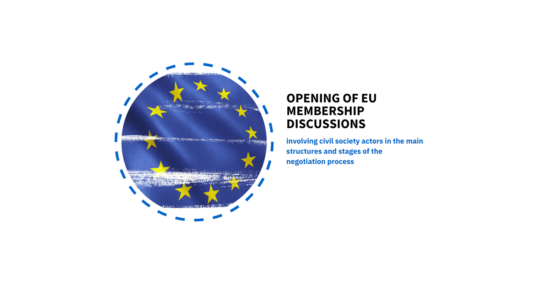
The workshop organized in Tirana is the first of a series of workshops that will be organized throughout the country by the European Movement in Albania and the National Resource Centre for Civil Society.
The aim of the workshops is to inform CSOs about the negotiation process, negotiation structures and opportunities for CSO involvement in the negotiation process. The workshop held in Tirana on October 14, brought together 18 civil society organizations and experts in the field.
The first session of the workshop was led by Gledis Gjipali, EMA, who, among other things, spoke about the recently published European Commission report on Albania, focusing on the developments of the preparation process and the progress of the chapters throughout the year analyzed in the report. Bringing examples from other countries, Gjipali analyzed good practices and lessons that can help and facilitate the negotiation process for Albania.
The second and third sessions were led by Altin Fuga from MEPJ, who spoke about the institutional structures of the integration process, as well as explained the negotiation process, with a special focus on the participation of civil society, providing practical cases and information relevant to a clearer overview of structure and process. During this session, the ‘screening’ process for Chapter 28 was followed in real time, as well as concrete cases from previous meetings were brought up.
The participants showed interest and were active in discussions on Albania’s progress and how civil society actors can be better involved to address and solve problems they encounter.
***
For the period 2022-2025, 12 workshops are planned to be held by EMA in several cities of Albania, within the framework of the National Resource Centre for Civil Society in Albania supported by the European Union, and implemented by the Partners Albania for Change and Development in cooperation with the European Movement in Albania and the Albanian Center for Population and Development.
P2P Event: The Role of the Civil Society in the EU Accession Process
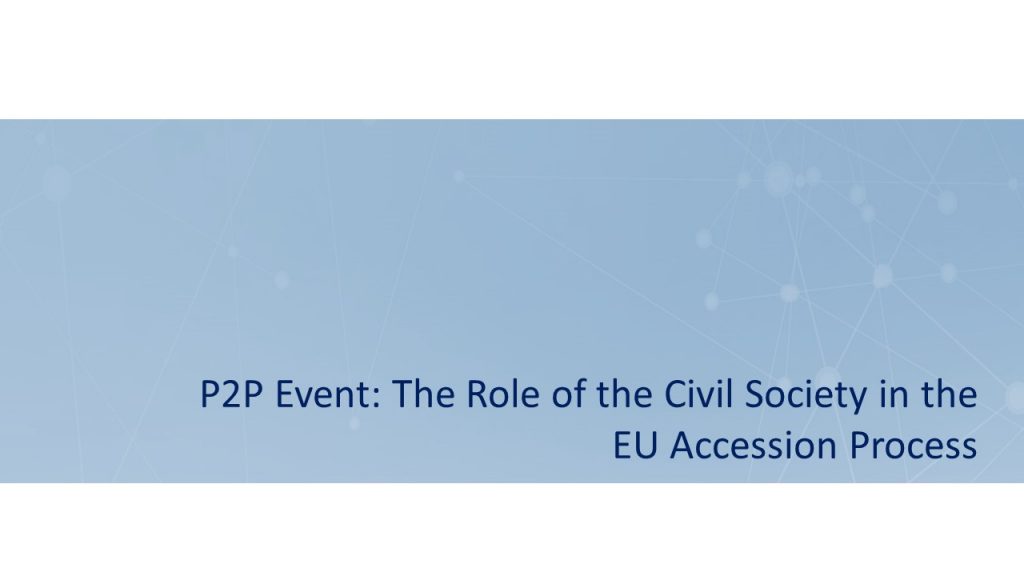
On October 26, 2021, EU TACSO 3 organized a two-day event on the Role of Civil Society in the EU Accession Process. Representatives from civil society organizations, state institutions, European Union Delegations from the region, DG NEAR, international organizations and experts, attended the event and discussed the mechanisms for
involving CSOs in the EU accession process and IPA program structures.
Ariola Agolli, Resource Centre Manager, in her speech as part of the panel, focused on the main challenges for the effective and real involvement of CSOs in the EU Accession process as well as on recommendations for CSOs, government institutions in it all levels as well as the European Union to improve the situation in this regard. For more
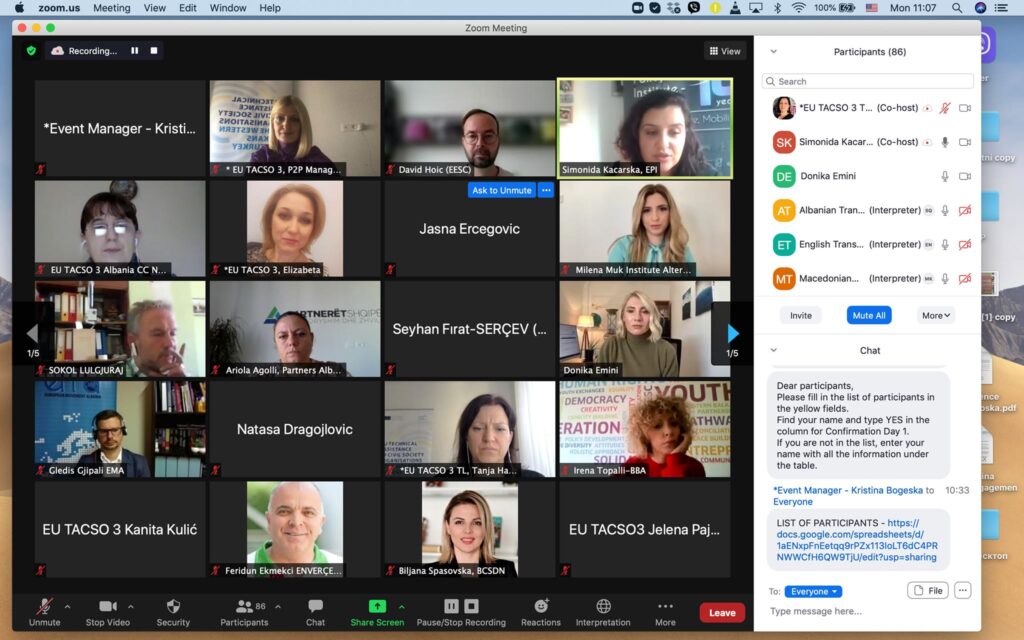
Physical Distancing and Social Solidarity

- Listen to grantee partners and together explore how you can best help them face the crisis, trusting they know best what is needed in their own contexts.
- Encourage the re-design and re-scheduling of planned activities and deliverables and provide clear guidance on how to seek approval for these changes.
- Support new and creative ways of creating a culture of solidarity and interaction while adhering to the physical distancing and other precautionary measures.
- Offer greater flexibility by reconsidering payment installments based on actual needs, converting existing project grants into unrestricted funds, or adding extra funds to help build-up reserves or cover unexpected costs.
- Simplify reporting and application procedures and timeframes so that civil society groups can better focus their time, energy and resources in supporting the most vulnerable rather than on meeting heavy reporting and due diligence requirements.
- Keeping close contacts with its sub-grantees to discuss the best way possible to adjust to the situation and support them.
- Swiftly assess the effect of the situation on the civil society organizations in the country. A questionnaire has been already sent out which can be accessed here https://www.surveymonkey.com/r/PSM9W95
- Provide relevant information to the sector with regard to COVID-19. For that you can visit the new window on our website, labeled COVID-19 where you may find information on government measures, measures and instructions affecting the NPOs, main links to websites reporting on the pandemic, inspiring stories and innovation taking place in Albania and globally.
- Provide free services for civil society groups. We are working to provide free access to online platforms to groups in order to support their activity.
- Provide training on the use of such platforms.
- Facilitate volunteer mobilizing and fundraising efforts.
Press release of the High Judicial Council
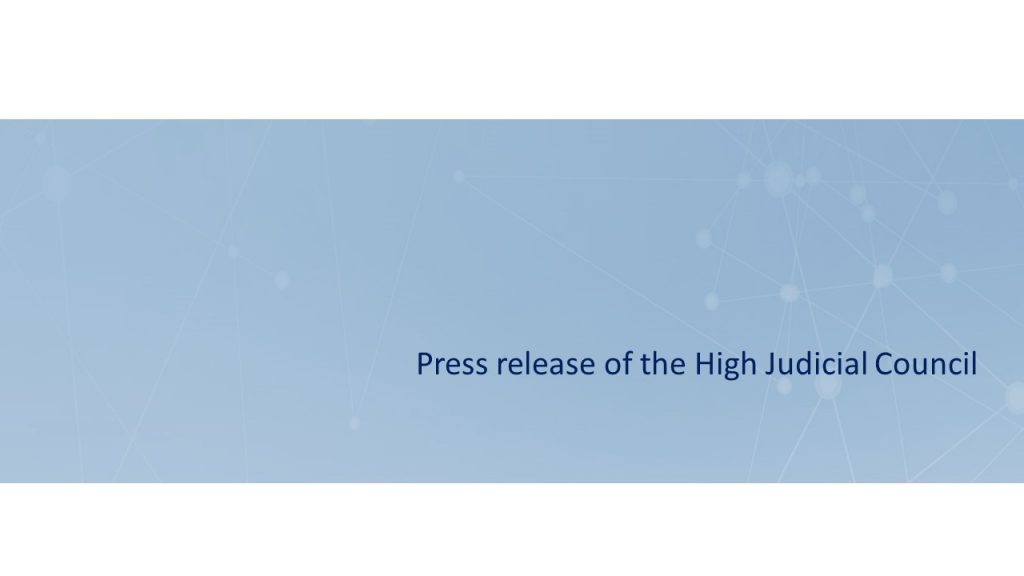
The High Judicial Council has issued a press release in which is expressed its position regarding the obligations created by Law no. 80/2021 “On the registration of non-profit organizations” in general and in particular by the article 52/3, which requires within 30 August 2021, the setting of the date for the functioning of the NPOs registration system, based on communication and electronic review of requests for their registration.
The High Judicial Council analyzed and discussed regarding the obligations created by Law and in conclusion could not make a decision regarding the date when the electronic register of NPOs will be functional due to the lack of budgetary funds planned by the Ministry of Finance for this purpose. The Council requested the cooperation of the responsible public actors, to respect the legal obligations, the sub-legal act approved with Decision of the Council of Ministers no. 539, dated 25.07.2019, “On the approval of the roadmap for the government policy towards an enabling environment for the development of civil society 2019 – 2023”, to enable the creation and functioning of electronic registration as an expression of efforts to guarantee and promote transparency, accountability, integrity and public trust in the administration and management of NPOs.
The above confirms once again what we have articulated throughout the last year as part of discussions and consultations with institutions, that the process of drafting and approving the law has been rushed, not well planned and without the involvement of institutions responsible for the law implementation, in this case related to the creation and management of the electronic register of NPOs.
For more, the official press release HERE http://klgj.al/njoftim-per-shtyp-date-26-gusht-2021/.
Press Statement – Assembly approves important justice reform amendments in the absence of a consultation process and transparency
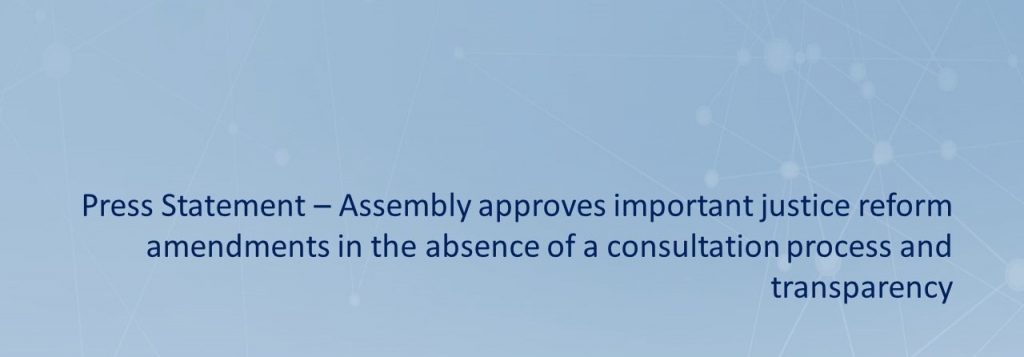
- Alliance Against Discrimination LGBT
- Balkan Investigative Reporting Network Albania, BIRN Albania
- Civil Rights Defenders
- Center for Bridging Communities
- CRCA / ECPAT Albania
- Down Syndrome Albania Foundation
- Mary Ward Loreto Foundation
- Albanian Foundation for the Rights of Persons with Disabilities (ADRF)
- Joscelyn Foundation
- Foundation Together
- Open Society Foundation Albania
- Foundation Raf
- Foundation “Partnerity for Development”
- Albanian Human Rights Group
- Women in the Focus on Development
- Institute of Political Studies (ISP)
- Institute for Democracy and Mediation (IDM)
- Institute of Roma Culture in Albania
- Institute for Legal and Public Studies
- Institute for Habitat Development (Co-Plan)
- Albanian Media Council
- Albanian Helsinki Committee
- Egyptian Youth Movement
- Observatory for the Rights of the Child and Youth
- Organization “Different and equal”
- Organization “Woman to Woman”
- Organization YMCA Tirana/Albania
- Organization “People in Focus”
- Organization “Well Point – Care for All”
- Organization “Help Life”
- Organization for the Protection of the Rights of Persons with Disabilities – MEDPAK
- Albania Partners for Change and Development
- National Platform for Women
- Gender Alliance for Development Center
- European Center
- Center Albanian Consumer
- Center “Treja”
- Center “Community Reporters Albania”
- Center for Community Development “Today for the Future”
- Center for the Study of Democracy and Governance
- Albanian Center for Economic Research (ACER)
- Center for Integrated Legal Services and Practices
- Center for Transparency and Free Information
- Science and Innovation Development Center (SCiDEV)
- Center for Civic Legal Initiatives
- ALTRI Center
- Youth Center “Perspective”
- Center “Human Rights in Democracy”
- Albanian Center for Family Development
- Center for Mental Health – Mental Health Albania
- Center for the Promotion of Competitiveness
- Center “Res Publica”
- Roma Active Albania
- Women and Social Services Counseling Center (Kukës)
- Women’s Empowerment Network in Albania (AWEN)
- Women’s Democracy Network – WDN Albania
- Young Professionals Network
- Active Information and Citizenship Network
- Tirana Free Legal Service (TLAS)
- National Association of Professional, Business and Craft Women
- Association “For the benefit of Albanian women”
- Association “Parental Hand”
- Association “Young Intellectuals, Hope”
- Albanian Nurses Association
- Women’s Association “Reflections”
- Association “Voice of Rome in Albania”
- Association of Lushnja
- Association “Beyond Barriers”
- Association “Craftsmen of the North”
- Association “Movement for Tourism Development” Ksamil
- Physical Benefit Association in Korça
Public Appeal “On the draft law on Registration of Non-Profit Organization”
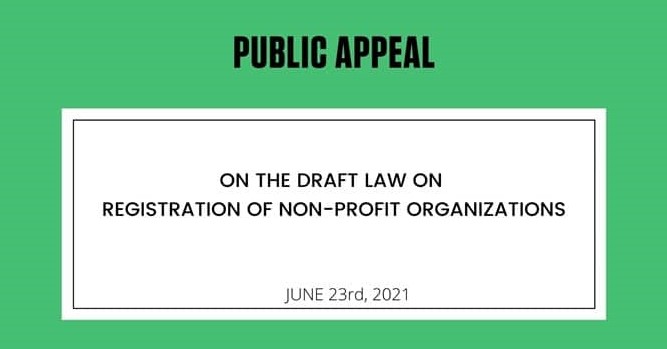
23 June 2021
Public Appeal
“On the draft law on Registration of Non-Profit Organization”
We, representatives of civil society organizations in the country, have followed with interest the entire drafting process of the new draft law “On the registration of non-profit organizations”, expected to be voted in the plenary session on June 24, 2021. This public appeal is part of our continuous engagement and collaborative efforts in this process.
From more than a year, since the draft law was made public by the Ministry of Justice until its approval by the Committee on Legal Affairs, Public Administration and Human Rights, despite the involvement of foreign expertise, the principles and legal framework of public consultation in the Republic of Albania have not been respected. The approach of the institutions has not been inclusive and enabling to bring together all actors in an open discussion about an important draft law for the functioning of the sector. The communication with stakeholders has been non-transparent, undermining their ability for a meaningful and significant contribution.
We asses that major concerns raised and recommendations given with regard to guaranteeing the freedom of association, have not been taken into account and are not reflected in the draft law published by the Albanian Parliament.
This draft law is expected to be voted with no clarity on the financial costs of the establishment and administration of the electronic register. It is also due to the fact that the institutions responsible for the establishment and administration of the register have not expressed any opinion on this issue. The draft law is expected to be approved without a deadline for the establishment and starting date of the register. All the above set ground for questioning the timing and quality of implementation of this legal initiative.
For us, civil society organizations, the draft law seriously violates the freedom of association, the principle of legal clarity, and that of proportionality of coercive measures. The draft law creates overlapping in coercive measures introduced and double reporting requirements with the existing legal framework. As of the above, the draft law contradicts Law 8788, dated 7.5.2001 “On non-profit organizations” and other laws and bylaws that regulate the activity of the sector, as well as international standards in respect of which we believe Albania is backsliding.
We are aware of the importance of the electronic register, not only as a need to address MoneyVal recommendations, but above all as a fulfilment of the sector’s longstanding requirement that will enable a proper assessment of the role and impact of its work. Any need to address international obligations by the Albanian state, should not infringe the right of the interest groups to be heard and consulted through an effective process.
In these circumstances, we, the civil society organizations, ask the Albanian Parliament to not approve this draft law, and to open a wide and participatory discussion reflecting on the requests and recommendations provided by the sector.
We remain committed to provide our expertise in a redesigned process according to the above principles, but we are also determined to pursue this issue further within the space guaranteed by the national and international legal framework.
(in alphabetical order)
Academy of European Integration and Negotiations– AIEN
ACLI – IPSIA (Albania)
Act for Society
Active Information and Citizenship Network
Agrinas Albania Foundation
Agropuka Association
Albanian Association of Italian Language Teachers (A.P.A.D.I)
Albanian Center – YMCA
Albanian Center for Environmental Governance
Albanian Center for Population and Development (ACPD)
Albanian Centre for Economic Research (ACER)
Albanian Coalition for Education (ACE)
Albanian Disability Rights Foundation (ADRF)
Albanian Forum – Shkodra Lake
Albanian Foundation for Local Capacity Development
Albanian Helsinki Committee
Albanian Journalists Union
Albanian National, Professional, Businesswomen and Crafts’ Association
Albanian Organization of the Order of Malta (Malteser Albania)
Albanian Women Empowerment Network – AWEN
AlbContact Center
Alternative Pro
AMARODROM
Antigonea Association – Gjirokastër
ARSIS, Social Organization for Youth Support
Association “Mountain Areas Development Forum”
Association for the Protection of Human Rights
Association of Albanian Municipalities
Association of Paraplegics Shkodra
Association of Persons with Disabilities
Balkan Investigative Reporting Network – BIRN Albania
Beyond Barriers Association
Business Improvement District- Association BID – Berat
Center for Counseling and Psychological Services
Center for Integrated Legal Services and Practices
Center for the Protection of the Rights of the Child in Albania – CRCA
Center for Women’s Roma Rights
CESVI COOPERAZIONE E SVILUPPO – ONLUS – Përmet
Civil Society Development Center – CSDC Shkodra
Community of Pope Giovanni XXIII
Consulting and Development Partners
Contact Art
Co-PLAN, Institute for Habitat Development
COSPE Albania
Council of Social Services Associations of Durrësi district
Counseling Center for People with Disabilities – Shkodra
Counseling Line for Women and Girls
Craftsmen of the North
Diellëza Organization
Different & Equal
Dorcas Aid International Albania
Ecological Club, Elbasan
Environmental Center for Protection, Education and Rehabilitation – (EPER Center)
“Epoka e Re” Youth Center
European Movement Albania – EMA
Faktoje.al Organization
Gender Alliance for Development Center (GADC)
Genesis Center
GO2 Organization for Sustainable Urban Planning
“Gjelbërimi 2000” Association – Vlora
Help the Life Association
Hope for the Future
Hope for the World
Hope for Us – Vlora
Human Dimension Organization
Institute for Development and Civic Initiatives
Institute for Political Studies
Integrimi Association in Tropoja
International Voluntary Projects, PVN
Joscelyn Foundation
Kolping Center
Light Steps Women Centre- Shkodër
“Me, the Woman” Association
Milieukontakt Albania
Missionaries of Social Rights, Kuçovë
Multifunctional Association for Culture, Development and Education
National Association for Integration and Development
National Paraplegic-Tetraplegic Association “Hope and Love”
Natural Resources Development Organization
New Bridges Organization – Berat
No Limits Center
Observatory for Children and Youth Rights
Open Horizon Association
Open Society Foundation for Albania
Opera Madonina del Grappa
Partners Albania for Change and Development
People First Association
Plan & Go Center
Power of Education
Protect Me – Vlore
Psycho-Social Centre “Vatra”
Puka Youth Centre
Ray of Hope Organization
Resource Environmental Center – Albania (REC)
Roma Active Albania
Roma Egyptian Youth Movement
Royal Albania Foundation
SCI – Social Contract Institute
Social Justice Organization
The association “Social Center to Help People in Need” Fushë-Arrëz
The Association “Udhëtim i Lirë – Liberi di Viaggiare”
The Door
The Institute for Democracy and Mediation (IDM)
The Science and Innovation for Development Centre (SCiDEV)
The Women’s Democracy Network Albania (WDN-Albania)
The youth of Ura Vajgurore
Tirana Legal Aid Society (TLAS)
Together for Roma Integration Association (TIRC)
Trainers in Education
Union of Albanian Producers
Useful to Albanian Women
Voice of Roma in Albania
With the Community for Change – Vlora
Woman in Integration
Woman in Progress Association
Women in Progress Shkodra
Women in Progress Tiranë
Women in Public Service Albania Center
Women to Women
YMCA Shkodër
Young Entrepreneurs Club
Young Intellectuals Hope
Youth Center Arka
Youth Voice Network
YWCA of Albania
Academy of Political Studies
Assist Albania Centre
Association “Refleksione”
Association AKS
Association Alternative
Association Egnatia
Association For Women and Children, Kombinat Centre (SHPGF)
Civil Rights Defenders, Albania
Cooperation and Development Institute
Council of Employers’ Organizations of Albania (KOPSH)
For Social and Environmental Welfare” Berat
Horizont EU
Institute for Policy & Legal Studies (ISPL)
Organisation LIBURNETIK
Urban Research Institute
Young Environmental Experts Association

